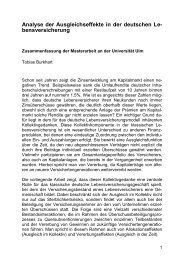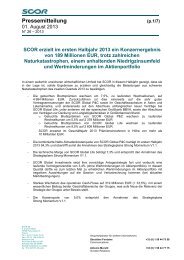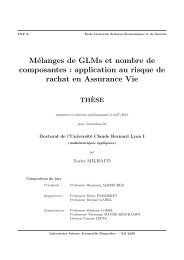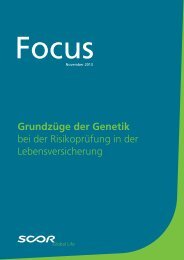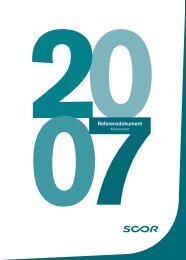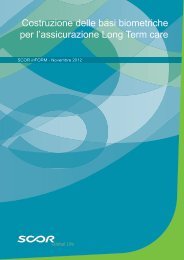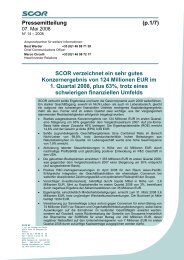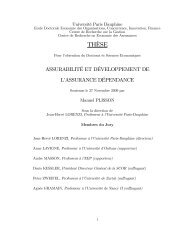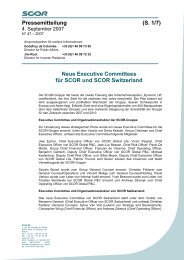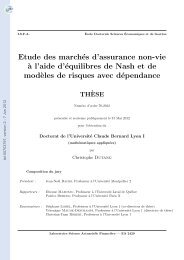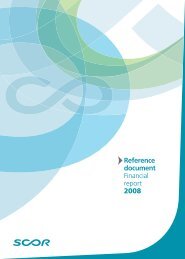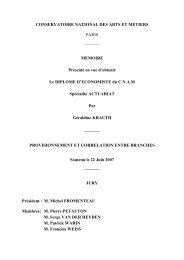4.4 Legal risk - Scor
4.4 Legal risk - Scor
4.4 Legal risk - Scor
Create successful ePaper yourself
Turn your PDF publications into a flip-book with our unique Google optimized e-Paper software.
(ILW) or collateralized reinsurance). Such securities could be impacted by the occurrence of insurance <strong>risk</strong>s (e.g. natural<br />
catastrophe, mortality,…) that could significantly result in changes in value, or even possibility the full loss of the<br />
invested amount. These <strong>risk</strong>s could also have a significant impact on the liquidity of such securities.<br />
4.2.4 SCOR IS EXPOSED TO FOREIGN CURRENCY EXCHANGE RATE FLUCTUATIONS<br />
Currency <strong>risk</strong> is the <strong>risk</strong> that the fair value or future cash flows of a financial instrument or balance sheet amount will<br />
fluctuate because of changes in foreign exchange rates. The following types of foreign exchange <strong>risk</strong> have been<br />
identified by SCOR:<br />
A. Transaction <strong>risk</strong><br />
Fluctuations in exchange rates can have consequences on SCOR’s reported net income because of the conversion<br />
results of transactions expressed in foreign currencies, the settlement of balances denominated in foreign currencies<br />
and the lack of perfect matching between monetary assets and liabilities in foreign currencies.<br />
B. Translation <strong>risk</strong><br />
SCOR publishes its consolidated financial statements in Euros, but a significant part of its income and expenses, as well<br />
as its assets and liabilities, are denominated in currencies other than the Euro. Consequently, fluctuations in the<br />
exchange rates used to convert these currencies into Euros may have a significant impact on its reported net income<br />
and net equity from year to year.<br />
SCOR’s main non-French legal entities are located in Switzerland, the Americas, the U.K. and Asia Pacific. The<br />
shareholders’ equity of these entities is denominated mainly in Euros, U.S. dollars, Canadian dollars or British pounds.<br />
As a result, changes in the exchange rates used to convert foreign currencies into Euros, particularly the fluctuation of<br />
the U.S. dollar against the Euro, have had and may have in the future, an adverse effect on the Group’s consolidated<br />
shareholders’ equity. SCOR does not fully hedge its exposure to this <strong>risk</strong>. The impact of the fluctuation in the exchange<br />
rates used to translate foreign currencies into Euros on its consolidated shareholders’ equity is described in “Section<br />
20.1.5 – Consolidated Statements of Changes in Shareholders’ Equity.”<br />
SCOR has issued debt instruments in currencies other than the Euro, currently U.S. dollars and Swiss Francs, and to<br />
the extent that these are not used as a hedge against foreign currency investments, it is similarly exposed to fluctuations<br />
in exchange rates.<br />
Forward sales and purchases of currencies are included in “Section 20.1.6 – Notes to the financial statements, Note 8 –<br />
Derivative Instruments.”<br />
Some events, such as catastrophes, can have an impact on the matching of assets and liabilities in a currency, which<br />
can generate a temporary unmatched position which is not covered by currency contracts or hedges.<br />
For the consolidated net position of assets and liabilities by currency, and for an analysis of sensitivity to exchange<br />
rates, refer to “Section 20.1.6 – Notes to the financial statements, Note 26 – Insurance and Financial Risk.”<br />
In spite of the measures to control and reduce SCOR’s exposure to fluctuations of exchange rates of major currencies,<br />
such fluctuation could have a material adverse impact on its business, present and future revenues, net income, cash<br />
flows, financial position, and potentially, on the price of its securities.<br />
4.2.5 THE VALUATION OF SCOR’S INTANGIBLE ASSETS AND DEFERRED TAX ASSETS MAY SIGNIFICANTLY<br />
AFFECT ITS SHAREHOLDERS’ EQUITY AND THE PRICE OF ITS SECURITIES<br />
A significant portion of SCOR’s assets consists of intangible assets, the value of which depends on its expected future<br />
profitability and cash flow. The valuation of intangible assets also assumes that the Group is making subjective and<br />
complex judgments concerning items that are uncertain by nature. If a change were to occur in the assumptions<br />
underlying the valuation of its intangible assets (including goodwill, VOBA and DAC), SCOR would have to reduce their<br />
value, in whole or in part, thereby reducing shareholders’ equity and its results.<br />
The recognition of deferred tax assets, i.e., the likelihood of recognizing sufficient profits in the future to offset losses,<br />
depends on applicable tax laws and accounting methods as well as the performance of each entity concerned. The<br />
occurrence of events, such as changes in tax legislation or accounting methods, operational earnings lower than<br />
currently projected or losses continuing over a longer period than originally planned could lead to the derecognition of<br />
part or all of the deferred tax assets.<br />
Acquisition costs, including commissions and underwriting costs, as well as the VOBA for life reinsurance, and the<br />
contractual rights with clients are recognized as assets subject to the profitability of the contracts. They are amortized on<br />
the basis of the residual term of the contracts in Non-Life, and on the basis of the pattern of recognition of future margins<br />
for Life contracts. As a result, the assumptions considered concerning the recoverable nature of the deferred acquisition<br />
costs, are affected by factors such as operating results and market conditions. If the assumptions for recoverability of<br />
DAC or VOBA are no longer appropriate, it would then be necessary to accelerate amortization.<br />
35



